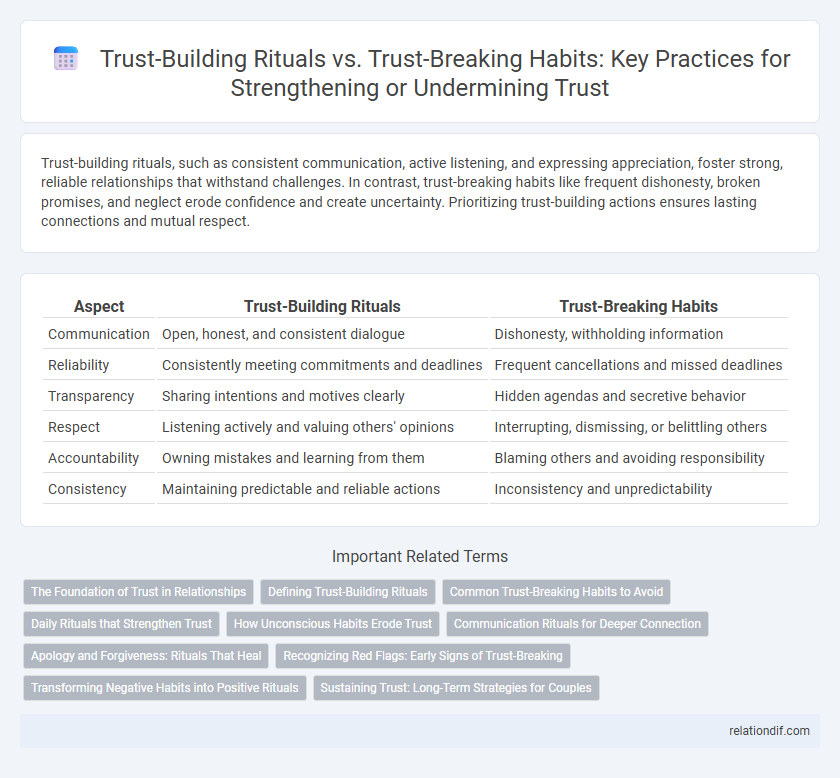Trust-building rituals, such as consistent communication, active listening, and expressing appreciation, foster strong, reliable relationships that withstand challenges. In contrast, trust-breaking habits like frequent dishonesty, broken promises, and neglect erode confidence and create uncertainty. Prioritizing trust-building actions ensures lasting connections and mutual respect.
Table of Comparison
| Aspect | Trust-Building Rituals | Trust-Breaking Habits |
|---|---|---|
| Communication | Open, honest, and consistent dialogue | Dishonesty, withholding information |
| Reliability | Consistently meeting commitments and deadlines | Frequent cancellations and missed deadlines |
| Transparency | Sharing intentions and motives clearly | Hidden agendas and secretive behavior |
| Respect | Listening actively and valuing others' opinions | Interrupting, dismissing, or belittling others |
| Accountability | Owning mistakes and learning from them | Blaming others and avoiding responsibility |
| Consistency | Maintaining predictable and reliable actions | Inconsistency and unpredictability |
The Foundation of Trust in Relationships
Consistent trust-building rituals, such as transparent communication and active listening, create a strong foundation for lasting relationships by fostering reliability and emotional safety. In contrast, trust-breaking habits like dishonesty and neglect erode this foundation, leading to insecurity and relational instability. Establishing and maintaining positive rituals enhances mutual respect and deepens connection, which are essential components of enduring trust.
Defining Trust-Building Rituals
Trust-building rituals consist of consistent actions such as active listening, transparent communication, and demonstrating reliability that foster mutual respect and confidence. These rituals create a foundation for psychological safety, enabling teams and relationships to flourish through predictability and accountability. Emphasizing intentional, repetitive behaviors strengthens emotional bonds and promotes long-term trust resilience.
Common Trust-Breaking Habits to Avoid
Common trust-breaking habits such as inconsistency, dishonesty, and neglect erode relationships and hinder collaboration. Avoiding frequent broken promises, failure to listen actively, and lack of transparency are crucial for maintaining trust. Practicing accountability and open communication prevents misunderstandings and fosters a trustworthy environment.
Daily Rituals that Strengthen Trust
Daily rituals such as consistent communication, active listening, and transparent actions significantly reinforce trust within relationships by fostering reliability and openness. Regularly practicing gratitude and acknowledging others' efforts create a positive feedback loop that deepens mutual respect and confidence. Avoiding secrecy and promptly addressing misunderstandings help sustain trust through accountability and emotional safety.
How Unconscious Habits Erode Trust
Unconscious habits such as inconsistent communication, neglecting commitments, and dismissing feedback gradually erode trust by signaling unreliability and disrespect. These behaviors create a subtle yet persistent perception of disengagement, undermining relational stability and collaboration. Recognizing and addressing these automatic patterns is essential to foster trust-building rituals that promote openness, accountability, and mutual respect.
Communication Rituals for Deeper Connection
Consistent communication rituals such as daily check-ins and active listening foster deeper trust by creating a safe space for open dialogue and emotional transparency. Avoiding trust-breaking habits like interrupting or dismissiveness reinforces reliability and respect, essential for sustaining strong relationships. These communication rituals enhance mutual understanding, making trust more resilient over time.
Apology and Forgiveness: Rituals That Heal
Apology and forgiveness act as powerful trust-building rituals that restore damaged relationships by fostering honesty and emotional openness. Consistent, sincere apologies dismantle barriers of resentment, while forgiveness rituals repair trust fractures, promoting emotional resilience and mutual respect. Neglecting these practices leads to trust-breaking habits marked by avoidance and lingering grudges, ultimately eroding interpersonal bonds and communication.
Recognizing Red Flags: Early Signs of Trust-Breaking
Recognizing early signs of trust-breaking involves identifying inconsistent behaviors, such as repeated dishonesty or failure to follow through on commitments, which erode mutual confidence. Trust-building rituals like transparent communication and active listening counteract these red flags by fostering accountability and emotional safety. Awareness of subtle trust breaches enables timely intervention, preserving relationship integrity and preventing deeper damage.
Transforming Negative Habits into Positive Rituals
Transforming negative habits into positive trust-building rituals involves consistent communication, active listening, and demonstrating reliability in daily interactions. Regularly practicing transparency and accountability can replace patterns of secrecy and inconsistency, fostering stronger interpersonal connections. Emphasizing empathy and follow-through helps convert distrust into collaborative trust, enhancing team dynamics and relationships.
Sustaining Trust: Long-Term Strategies for Couples
Consistent communication and active listening are essential trust-building rituals that foster emotional intimacy and mutual understanding in couples. Avoiding trust-breaking habits like secrecy, dishonesty, and neglect preserves relational integrity over time. Sustainable trust relies on transparency, accountability, and shared vulnerability, forming the foundation for enduring love and partnership.
Trust-Building Rituals vs Trust-Breaking Habits Infographic

 relationdif.com
relationdif.com